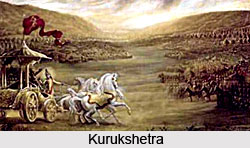 Battle at Kurukshetra forms a vital part of the great epic of Mahabharata which was believed to have continued for eighteen days. The battle dates from 5561 BC to 800 BC and it is based upon the astronomical and literary information from the epic itself. The mythology of the Kurukshetra War is also traced to the Battle of the Ten Kings which is also described in Rig Veda. The description of the battle of Kurukshetra is very well provided in the chapters from six to ten or Parvas that deal with the war. Though the actual historic evidence with regard to the date of the Battle at Kurukshetra is not mentioned, yet several historians think that the war took place in 3139 BC or 3102 BC. However, as per Arya Bhatta, the great mathematician and astronomer of India, the Mahabharata war was fought during the year 3137 BC. It was also known as the `Battle for Dharma`. In this Battle at Kurukshetra two families, the Pandavas and the Kurus, fought for the kingship and the supportive Kings took part in the Great War and the war ended with the victory of the Pandavas.
Battle at Kurukshetra forms a vital part of the great epic of Mahabharata which was believed to have continued for eighteen days. The battle dates from 5561 BC to 800 BC and it is based upon the astronomical and literary information from the epic itself. The mythology of the Kurukshetra War is also traced to the Battle of the Ten Kings which is also described in Rig Veda. The description of the battle of Kurukshetra is very well provided in the chapters from six to ten or Parvas that deal with the war. Though the actual historic evidence with regard to the date of the Battle at Kurukshetra is not mentioned, yet several historians think that the war took place in 3139 BC or 3102 BC. However, as per Arya Bhatta, the great mathematician and astronomer of India, the Mahabharata war was fought during the year 3137 BC. It was also known as the `Battle for Dharma`. In this Battle at Kurukshetra two families, the Pandavas and the Kurus, fought for the kingship and the supportive Kings took part in the Great War and the war ended with the victory of the Pandavas.
Preparations for War
The thirteen years` exile was over, and the Pandavas, by their prowess in battle, had revealed themselves to their friends. They started to prepare themselves for the Great War and Dhritarashtra, hearing of it, sent an ambassador charged with vague words of peace and friendship to the Pandavas, but not empowered to make any definite proposal for giving them back their kingdom and property. When the Pandavas hear the words of the ambassador, all agreed with Yudhisthir that there was only one answer to be given to them that if they would give them their kingdom then its fine, otherwise they should be ready for a combat. It then became clear to all men that nothing remained for either family but war. The aggressions of Duryodhana had been too many and too persistent. 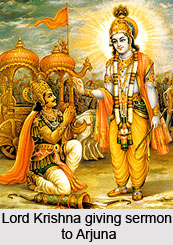 The insults offered to the Pandavas at the gambling party had been too personal and too offensive. Duryodhana, moreover, had all the opportunity he craved. For thirteen years, while his cousins were in exile, he had enjoyed the power of making alliances and dispensing benefits. It was then for him to test the faithfulness and the courage of the friends he had won. The clouds of war hung thick and black above the rival houses, and both knew now that the contest must be to the death.
The insults offered to the Pandavas at the gambling party had been too personal and too offensive. Duryodhana, moreover, had all the opportunity he craved. For thirteen years, while his cousins were in exile, he had enjoyed the power of making alliances and dispensing benefits. It was then for him to test the faithfulness and the courage of the friends he had won. The clouds of war hung thick and black above the rival houses, and both knew now that the contest must be to the death.
Both the princely families started hurriedly to get the favour of their friends and relatives in the forthcoming Great Battle. While Arjuna was able to get Krishna in his side, Duryodhana was awarded with the huge army of Lord Krishna who would fight in the side of the Kauravas. Several ancient kingdoms took part as allies of the rival clans in the battle. The place of the battle was chosen to be Kurukshetra, which lies in the modern state of Haryana in India. In the battle leaders from Pragjyotisha (Assam), Avanti and Dakshinaapatha, Yavanas, Sakas, Matras, Kaikeyas, Sindhus, Sauviras and Kings of Panchala, Kosala, Kasi, Magadha, Matsya and Yadus took part. The war was the first of its kind which was fought only during the daytime between dawn and dusk with certain sets of rules and regulations.
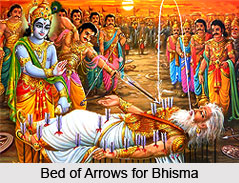 Krishna`s Message to Arjuna
Krishna`s Message to Arjuna
When the date of the starting of the Battle at Kurukshetra was set, Duryodhana appointed Bhishma as the commander of the Kaurava army and the Pandava army was led by Dhrishtadyumna, the brother of Draupadi. On the first day of the war, Arjuna, seeing all his brothers and other family members and friends and his own Guru, decided not to fight against them. He told to Krishna that he would not fight against his own people and kill them just for the same of the kingdom and thus would not require anything and would never desire any wealth and kingdom at the cost of the lives of his near and dear ones. To this type of behaviour of Arjuna, Krishna, who acted as his charioteer then, uttered some partly philosophic and partly devotional speeches which became the `Bhagavad Gita`. He gave Arjuna the core knowledge of the cycle of life and death in this world and told him to do his karma or duty without thinking of the result and if he could be successful in doing it then he would be the proper follower of his own Dharma. Krishna also exposed is divine self to Arjuna and explained him that whatever in done and is to be done in the world is done according to the wishes of the almighty and people like him and others are only puppets in the hands of god. Thus, he urged Arjuna to do his duty and work according to his Dharma which was to fight for Dharma or truth. Then Arjuna was satisfied by the explanation of Krishna and consented to fight for the cause of truth in the great battle at Kurukshetra.
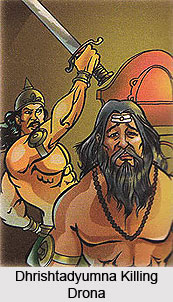 Bed of Arrows for Bhisma
Bed of Arrows for Bhisma
Bhishma, the grandsire of the Pandavas and the Kauravas, was the commander of the Kaurava army and he was so skilled an archer that his arrows never missed his target. He killed several trusted generals of the Pandavas one after the other. Everyday he used to kill thousands from the side of the Pandavas and it continued till the first nine days of the Great War. There was sorrow in the camp of the Pandavas since they knew that as long as their Grandsire exist, they would not be able to win the battle. Bhishma once told of his weakness to the Pandavas that he would not use arms against women and if someone fights with him being protected by a woman then he would not use arms against him. Thus on the tenth day of the war, the great archer o-f the Pandavas, Arjuna took Srikhandi in his chariot and headed for a combat with Bhisma. Then Arjuna was able to overcome Bhisma in the war and showered several arrows over his grandsire so that he fell on the ground over a bed of arrows.
Death of Drona
Bhisma was laid on a bed of arrows by Arjuna who gave several wounds to his grandsire in the battle and thus Duryodhana gave the command of his army to his guru Drona or Dronacharya. Drona was a renowned fighter blessed with the capacity to use all the divine weapons and he fought very bravely against the Pandavas. After a time it became evident that under his direction all the strength of the Kurus was being concentrated on the seizure of Yudhishthira, for Drona made a vow to capture the Pandava king. The enemy, on the other hand, had aimed from the beginning at the personal defeat of Drona and it was the dearest wish of Arjuna that his old master should be taken alive. As long as Ashvatthaman, the son of Drona, lived it came to be believed that his father would never be conquered, for his love and hope for his son were sufficient to keep him filled with courage and energy. Bhima, therefore, being bent on the defeat of Drona, selected an elephant named Ashvatthaman and slew it with his own hands, and then threw himself in his might on the Kuru front in the neighbourhood of Drona, and shouted that Ashvatthaman was dead.
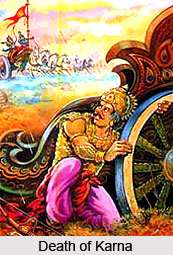 When Drona heard it, his hear sank for the first time and he went towards Yudhishthira and asked him the truth, since the eldest Pandava was known for his truthfulness. Yudhishthira replied to Drona in a clear voice for three times that Ashvatthaman was dead but for three times after he uttered the word Ashvatthaman he also told, `the elephant` but the same was not heard by Drona. Thus Drona left all his weapons and sat on the ground before his own chariot in a meditation. At that moment, Dhrishtadyumna uplifted his sword and cut off Drona`s head, which was at once raised from the ground by his supposed slayer and tossed like a ball into the midst of the Kuru hosts.
When Drona heard it, his hear sank for the first time and he went towards Yudhishthira and asked him the truth, since the eldest Pandava was known for his truthfulness. Yudhishthira replied to Drona in a clear voice for three times that Ashvatthaman was dead but for three times after he uttered the word Ashvatthaman he also told, `the elephant` but the same was not heard by Drona. Thus Drona left all his weapons and sat on the ground before his own chariot in a meditation. At that moment, Dhrishtadyumna uplifted his sword and cut off Drona`s head, which was at once raised from the ground by his supposed slayer and tossed like a ball into the midst of the Kuru hosts.
Death of Karna
After the death of Drona, Duryodhana appointed Karna as the commander of his army. Karma was a brave fighter, and even though he knew that he was the eldest son of Kunti, he never betrayed the friendship of Duryodhana and fought till his death against the Pandavas which marked his faithfulness towards his friend. Previously, Karna disguised himself as a Brahmin and got the training in warfare from the great warrior Parasurama, incarnation of Vishnu, who would only train the Brahmins. The guru was pleased by the achievements of Karna but he was however able to know the actual identity of Karna and cursed him that he would forget the use of divine weapons when he would require them the most and in a war the wheel of his chariot would go under the ground resulting in serious consequences. Thus, in a single combat with Arjuna, the wheel of Karna`s chariot was stuck under the ground and at that moment his use of divine weapons also failed and then Arjuna killed him in the battle.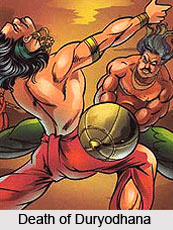
Death of Duryodhana
One after the other, all the great warriors of Duryodhana died including Guru Drona, his brother Dushasana and other brothers and his beloved friend Karna. Still, Duryodhana remained with unabated courage, determined neither to give nor to take quarter. He was ultimately killed by Bhima in a single combat and all their schoolboy enmities fulfilled in the death of the eldest son of Dhritarashtra.
The death of Duryodhana marks the end of the great battle of Kurukshetra which was fought for eighteen days and thus Yudhishthira and his brothers enjoyed their victory. The great battle at Kurukshetra also gives a message that even if the entire world is in the wrong side, then also the side of truth will triumph. This battle thus presents itself as a battle of truth against evil and the subsequent victory of the truth and dharma over untruth and papa or crime.



















